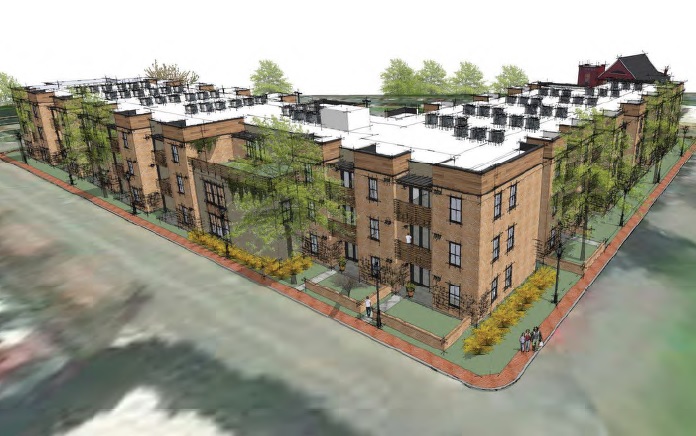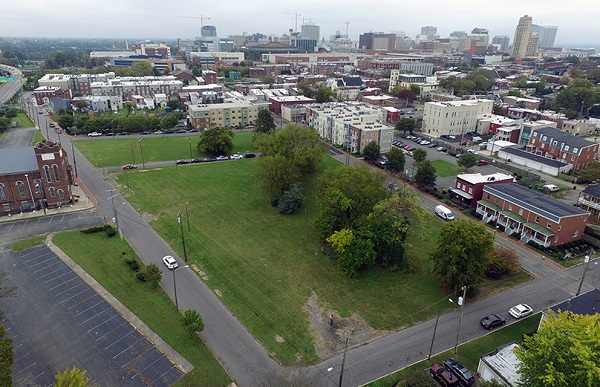
A rendering of the apartment building planned by the Better Housing Coalition. (Courtesy of Baskervill)
A development that’s set to add dozens of new apartments for lower-income renters is moving forward in Jackson Ward, after clearing a deed restriction hurdle that revealed some neighborhood opposition to the project.
The 67-unit apartment building planned by local nonprofit Better Housing Coalition can now fill the entire city block that’s bordered by Cameo, Jackson, Price and Duval streets, following a vote Monday by the Richmond City Council releasing a lien on one of the parcels that make up the 1.5-acre site.
The lien was tied to a development agreement between the city and the Richmond Redevelopment & Housing Authority, which previously owned the land, that called for a single-family dwelling to be built on the parcel at 30 W. Jackson St.
The RRHA later sold the land to developers Robin Miller and Ron Stallings, who are now under contract to sell it to BHC, but the deed restriction wasn’t cleared up when the site was rezoned for a multifamily development that never materialized.
The deed issue was introduced at a council meeting in December, around the time that BHC was set to close on the property. But a decision was deferred twice since January, in light of opposition to the project from neighbors who argued that Jackson Ward has become too apartment-heavy.
“Enough is enough when it comes to rental apartments,” said Vicki Mollenauer, a nearby resident who spoke in a hearing at Monday’s meeting.
Noting other apartment buildings that have risen along Jackson Street, Mollenauer said, “So many of us who live here in historic Jackson Ward are passionately opposed to this project, not because we don’t want affordable housing in our backyard, but because we also want to provide the opportunity of affordable homeownership for those who have lived in and love the neighborhood they grew up in. This project does not afford that option.”
Councilmember Katherine Jordan, whose Second District includes Jackson Ward, said opponents were not looking to prevent BHC’s project, but rather to have it include some homeownership options such as those envisioned with Miller and Stallings’ proposal, which called for more than 100 homes with a mix of rental and for-sale units.
“They’re not trying to kill the whole plan,” Jordan said, referring to BHC’s proposal. “They just want a portion of the plan they helped create to rebuild homeownership in Jackson Ward.”
With Miller and Stalling’s prior plan calling for more units, Jordan maintained that there was enough allowable density for BHC to add or work in some for-sale units with its 87 apartments. But she said she was told that doing so would be too expensive or otherwise impossible.
“They could do this,” Jordan said of BHC. “At every juncture when the community asked if they could adjust some of the programming … the answer was no.”
Earlier in the meeting, Lynn McAteer, a vice president with BHC, said the nonprofit had engaged the community for over a year about its proposal, which she described as meeting the density sought when the land was rezoned.
“Better Housing Coalition has worked diligently to put forth a high-quality affordable housing development,” McAteer said. “We have respected the architecture of Jackson Ward, and we have met consistently with the community since last February.
“While I appreciate their objections to more rental housing,” she said, “it is allowed by right, and this little title issue should’ve been cleared up by the city in 2007 when that rezoning occurred.”
Housing advocates and other speakers voiced support for the project, which also was well-received by a majority of councilmembers, who stressed a need for more housing options in the city and to meet that demand across all of its districts.
“There is clearly an urgent and pressing need for quality affordable housing in our city, and that’s been articulated as a priority for residents, for the administration and certainly for this council,” President Cynthia Newbille said.

The unimproved city block is across Duval Street from Sixth Mount Zion Baptist Church in Jackson Ward. The smaller block beside it is not included in the development. (BizSense file)
“It is critical that we look across the city footprint — not just a particular district but citywide — at this opportunity and responsibility to provide quality affordable housing, both home rental as well as home ownership,” Newbille said. “In this instance, we have an opportunity to provide quality affordable home rentals.”
Kristen Larson of the Fourth District joined Jordan in opposing the vote, which clears a path for BHC to move forward with the $11 million project, which is scheduled to start in early summer and last 15 months.
The one-, two- and three-bedroom apartments would range in monthly rents from $650 to $1,150. The bulk of the units will be restricted to households earning between $21,000 and $51,800 a year, or between 40 and 60 percent of the area median income. Twelve units will be reserved as subsidized housing for tenants who would pay no more than 30 percent of their income on rent.
Baskervill is designing the building, and Timmons is handling engineering. BHC has selected UrbanCore Construction as the contractor.
The development involves funding commitments from the city, Virginia Housing, the Virginia Department of Housing and Community Development, and other sources. RRHA would provide rental assistance.
Jordan maintained that the apartments are a missed opportunity to provide a mix of housing options in Jackson Ward, a neighborhood once known as Black Wall Street that lost much of its housing stock when what’s now Interstate 95 was constructed through the middle of it in the late 1950s.
Citing a survey that showed fewer than 20 percent of homes in Jackson Ward are owner-occupied, Jordan said, “This community is not against affordable housing. It’s against the continual chipping away at the foundations of what enabled Jackson Ward to be a nationally recognized incubator for Black wealth building and economic stability.
“Boosting our affordable housing stock to address our housing shortage, and creating opportunities for generational wealth building, are not mutually exclusive,” she said.

A rendering of the apartment building planned by the Better Housing Coalition. (Courtesy of Baskervill)
A development that’s set to add dozens of new apartments for lower-income renters is moving forward in Jackson Ward, after clearing a deed restriction hurdle that revealed some neighborhood opposition to the project.
The 67-unit apartment building planned by local nonprofit Better Housing Coalition can now fill the entire city block that’s bordered by Cameo, Jackson, Price and Duval streets, following a vote Monday by the Richmond City Council releasing a lien on one of the parcels that make up the 1.5-acre site.
The lien was tied to a development agreement between the city and the Richmond Redevelopment & Housing Authority, which previously owned the land, that called for a single-family dwelling to be built on the parcel at 30 W. Jackson St.
The RRHA later sold the land to developers Robin Miller and Ron Stallings, who are now under contract to sell it to BHC, but the deed restriction wasn’t cleared up when the site was rezoned for a multifamily development that never materialized.
The deed issue was introduced at a council meeting in December, around the time that BHC was set to close on the property. But a decision was deferred twice since January, in light of opposition to the project from neighbors who argued that Jackson Ward has become too apartment-heavy.
“Enough is enough when it comes to rental apartments,” said Vicki Mollenauer, a nearby resident who spoke in a hearing at Monday’s meeting.
Noting other apartment buildings that have risen along Jackson Street, Mollenauer said, “So many of us who live here in historic Jackson Ward are passionately opposed to this project, not because we don’t want affordable housing in our backyard, but because we also want to provide the opportunity of affordable homeownership for those who have lived in and love the neighborhood they grew up in. This project does not afford that option.”
Councilmember Katherine Jordan, whose Second District includes Jackson Ward, said opponents were not looking to prevent BHC’s project, but rather to have it include some homeownership options such as those envisioned with Miller and Stallings’ proposal, which called for more than 100 homes with a mix of rental and for-sale units.
“They’re not trying to kill the whole plan,” Jordan said, referring to BHC’s proposal. “They just want a portion of the plan they helped create to rebuild homeownership in Jackson Ward.”
With Miller and Stalling’s prior plan calling for more units, Jordan maintained that there was enough allowable density for BHC to add or work in some for-sale units with its 87 apartments. But she said she was told that doing so would be too expensive or otherwise impossible.
“They could do this,” Jordan said of BHC. “At every juncture when the community asked if they could adjust some of the programming … the answer was no.”
Earlier in the meeting, Lynn McAteer, a vice president with BHC, said the nonprofit had engaged the community for over a year about its proposal, which she described as meeting the density sought when the land was rezoned.
“Better Housing Coalition has worked diligently to put forth a high-quality affordable housing development,” McAteer said. “We have respected the architecture of Jackson Ward, and we have met consistently with the community since last February.
“While I appreciate their objections to more rental housing,” she said, “it is allowed by right, and this little title issue should’ve been cleared up by the city in 2007 when that rezoning occurred.”
Housing advocates and other speakers voiced support for the project, which also was well-received by a majority of councilmembers, who stressed a need for more housing options in the city and to meet that demand across all of its districts.
“There is clearly an urgent and pressing need for quality affordable housing in our city, and that’s been articulated as a priority for residents, for the administration and certainly for this council,” President Cynthia Newbille said.

The unimproved city block is across Duval Street from Sixth Mount Zion Baptist Church in Jackson Ward. The smaller block beside it is not included in the development. (BizSense file)
“It is critical that we look across the city footprint — not just a particular district but citywide — at this opportunity and responsibility to provide quality affordable housing, both home rental as well as home ownership,” Newbille said. “In this instance, we have an opportunity to provide quality affordable home rentals.”
Kristen Larson of the Fourth District joined Jordan in opposing the vote, which clears a path for BHC to move forward with the $11 million project, which is scheduled to start in early summer and last 15 months.
The one-, two- and three-bedroom apartments would range in monthly rents from $650 to $1,150. The bulk of the units will be restricted to households earning between $21,000 and $51,800 a year, or between 40 and 60 percent of the area median income. Twelve units will be reserved as subsidized housing for tenants who would pay no more than 30 percent of their income on rent.
Baskervill is designing the building, and Timmons is handling engineering. BHC has selected UrbanCore Construction as the contractor.
The development involves funding commitments from the city, Virginia Housing, the Virginia Department of Housing and Community Development, and other sources. RRHA would provide rental assistance.
Jordan maintained that the apartments are a missed opportunity to provide a mix of housing options in Jackson Ward, a neighborhood once known as Black Wall Street that lost much of its housing stock when what’s now Interstate 95 was constructed through the middle of it in the late 1950s.
Citing a survey that showed fewer than 20 percent of homes in Jackson Ward are owner-occupied, Jordan said, “This community is not against affordable housing. It’s against the continual chipping away at the foundations of what enabled Jackson Ward to be a nationally recognized incubator for Black wealth building and economic stability.
“Boosting our affordable housing stock to address our housing shortage, and creating opportunities for generational wealth building, are not mutually exclusive,” she said.




Disgusting bait and switch. This project, based on the original intent of the land use, should have opened doors to home ownership for “low income” folks, and instead we end up with a project that will trap could-be owners into renting. Lest we forget the importance of home ownership when it comes to wealth building…
We do not oppose apartments. We oppose the gross misuse of this intentional allotment of land. This was supposed to pave a way for towards wealth building and home ownership. Instead renters will be leeched indefinitely.
I can understand wanting homeownership in the center of the neighborhood but this is clearly not the most desirable lot with the busy interstate right there. I could see keeping this stretch as a buffer of rentals and other uses while encouraging home ownership development for the blocks further in.
Exactly, it was sold to residents as working to improve the neighborhood AND the lives of people that live in it. BHC does maintain it properties but this does nothing to increase or build the household wealth of LMI families.
Ashley, I don’t see this as a bait and switch at all. The previous land owner may have envisioned something else, but that doesn’t obligate BHC to have the same plan for this property (title issue aside) any more than anyone else is bound to do that the previous owner wanted. I agree that owner-occupied homes would be a great addition to Jackson Ward. But wanting that — and demanding that a developer build that on a specific piece of property — are two different things. You might be “passionately opposed” and that is your right. But it doesn’t change the… Read more »
I’m not sure how this will “trap could-be owners into renting” and indefinitely leech renters. Nobody is forcing anybody to rent here and if they choose to rent here, they are free to leave when they want. It’s called personal responsibility and making wise decisions.
This actually appears to be a nice development for families to live in until they can afford to buy.
This project seems to be in dire need of some unique features that would benefit everyone. We have been involved in design/building affordable housing in NYC for over 10 years. We believe that housing should be affordable to build, own, and live in. Here’s a report from the Building Energy Exchange that shows how Passive House design translates directly to increased cash flow and economic advantages for all stakeholders.
Typical of RVA – the mess continues. Good Luck affording $1,000 rent on $21k a year, or $31k for that matter
Per the article, the cap is $51,800 for the $1,150 top end. While a lot of area income-restricted communities do have numbers that seem to make little sense, this does not appear to be one.
Is that brick? It actually looks nice — like the windows, massing — would likely be better if it was not so uniform…. I find it funny when Utopians argue with each other, trying to one-up on Utopian concerns — the whole idea that people need to be able to buy units right there only seems to benefit those who already own property in Jackson Ward and want more homeownership THERE in particular. It is, apparently, a place where there is not much of that. If I owned a home there, I would want more homeownership too — of course.… Read more »
The idea that people will WANT to buy a home in such a building is dubious, which is likely why the developers are not building such things, even with the subsidies. Far more likely is the market that wants to live there has aspirations to live elsewhere. EVENTUALLY, this could be desirable place to live, comparatively — if Broad ever got seriously cleaned-up and filled up being walking distance to it would be great, and having quick access to 95 a big plus too. I myself considered buying a home there, twice, once when I was moving to Virginia and… Read more »
Honestly, I shouldn’t waste my time responding. What a pompous comment. Jackson Ward is an amazing fulfilling legendary community to live in. Or using your adjective, it is quite NICE. Most of us living here chose the neighborhood because it was desireable for us.
Have fun in Petersburg.